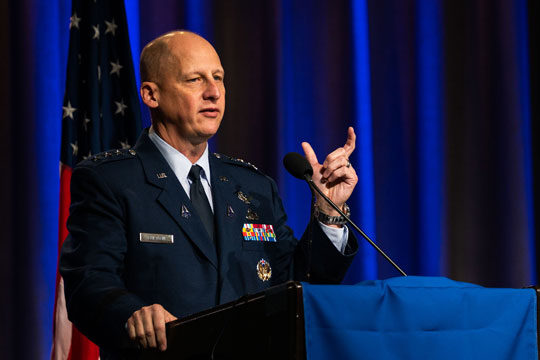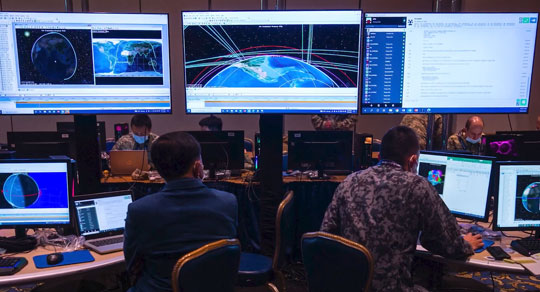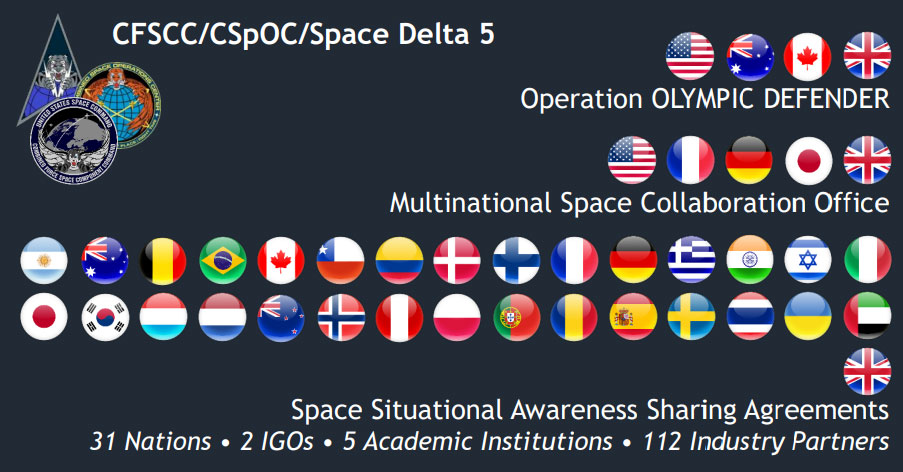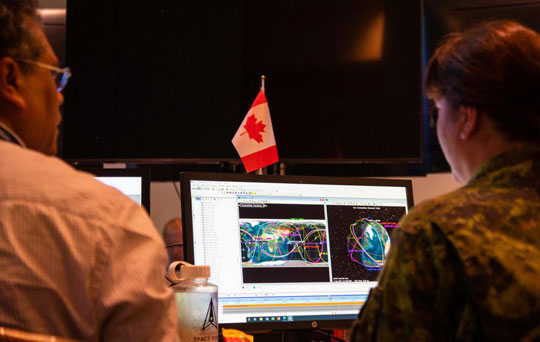 Space Systems Command Commander Lt. Gen. Michael Guetlein spoke at the AMOS conference in Maui, Hawaii, Sept. 28, 2022. File photo shows Guetlein at an AFA forum in November 2021. (Source: U.S. Space Force/Staff Sgt. Luke Kitterman)
Space Systems Command Commander Lt. Gen. Michael Guetlein spoke at the AMOS conference in Maui, Hawaii, Sept. 28, 2022. File photo shows Guetlein at an AFA forum in November 2021. (Source: U.S. Space Force/Staff Sgt. Luke Kitterman)
ALEXANDRIA, Va. — The head of U.S. Space Systems Command (SSC), Lt. Gen. Michael Guetlein called for improved information sharing with allies during a keynote speech at the Advanced Maui Optical and Space Surveillance Technologies (AMOS) conference.
“We’ve got to free the data,” Guetlein said, referring to space domain awareness (SDA) information shared between commercial partners and allied nations. “We have put so many constraints on the data, so many rules on what you can look at, what you can’t look at… We’ve got to free the data.”
Partnerships have become more critical amid rapid advances in national space capabilities and international recognition of space as a warfighting domain. Yet even among close allies, there is an ongoing struggle to overcome decades-old barriers to cooperation, including how partners share sensitive information.
The creation of the Space Force has helped remove some constraints. The United States has had “unprecedented levels of interaction” with allies in recent years, Guetlein noted. “The handcuffs aren’t off yet, but they sure have loosened up.”
Dealing with Over-Classification: NOFORN to YESFORN
Guetlein acknowledged that over-classification of U.S. space programs remained a problem—and a source of persistent frustration for some of America’s closest allies.
“I’ve got to lower the classification level,” he said. Defense space programs have traditionally been classified at the highest levels, he continued. “We’ve got to stop doing that. All we’re doing is hiding from ourselves. We’ve got to start having the critical conversations and open[ing] up the dialogue.”
 Participants from 25 nations engaged in Global Sentinel 2022 at Vandenberg Space Force Base, Calif. The multi-day exercises focused on building partnerships and improving operational coordination in the space domain. (Source: U.S. Space Command)
Participants from 25 nations engaged in Global Sentinel 2022 at Vandenberg Space Force Base, Calif. The multi-day exercises focused on building partnerships and improving operational coordination in the space domain. (Source: U.S. Space Command)
For decades, the U.S. imposed strict classification guidelines on military and intelligence space activities, designating virtually all associated data “NOFORN” (not releasable to foreign nationals). Both allies and U.S. officials have cited the de facto classification as a hindrance to close working relationships. An extreme example of the policy in action: the U.S. could receive sensing data from a foreign partner, process it through NOFORN software and it would become inaccessible to the country that produced it.
The U.S. has begun to reverse the over-classification trend. Starting around 2016, the outgoing head of then-Air Force Space Command, Gen. John Hyten, began reviewing and removing the NOFORN classification of certain programs. That set the stage for continued work to make more information accessible to allies and end the de facto use of the NOFORN classification. Advocates for increased transparency have adopted the catchphrase “YESFORN” to show their support for the changes.
The U.S. is also updating Space Situational Awareness (SSA) Agreements regularly and expanding the number of SSA partners. As of spring 2022, the U.S. had bilateral SSA Agreements with 31 countries and over 110 industry partners. The SSA agreements include 15 NATO countries, the Five Eyes alliance, Brazil, Chile, Finland, India, Israel, Japan, Republic of Korea, Sweden, Thailand, and the United Arab Emirates.
 As of April 2022, the U.S. had 31 bilateral SSA sharing agreements with partner nations and over 110 with commercial partners. (Source: DoD/SpOC)
As of April 2022, the U.S. had 31 bilateral SSA sharing agreements with partner nations and over 110 with commercial partners. (Source: DoD/SpOC)
These sharing agreements provide advanced information at various classification levels, including data related to orbit conjunctions, collision avoidance, end-of-life support and other services. The insights are deeper than publicly accessible SSA and space traffic management (STM) datasets available through Space-Track, overseen by U.S. Space Command and the Combined Force Space Component Command.
Some of the closest space partnerships are between Australia, Canada, France, Germany, New Zealand, the United Kingdom and the United States. Those countries make up the Combined Space Operations (CSpO) initiative, which seeks to improve cooperation, coordination and interoperability among allies in the space domain, including through multinational networked operations centers.
Technical Compatibility
Technical compatibility and data standards are also a hurdle to effective information sharing, though they often get less public attention than other issues. The challenges include navigating classified networks that were not designed to interface with external networks and ensuring data is collected in a form it can be used.
Data integration and translating data from across disparate sources continue to be a challenge, despite recent progress. Guetlein noted the need for Space Force to replace legacy systems with better communication pipelines that can match the processing needs of the 21st century. The DoD’s JADC2 (Joint All Domain Command and Control) architecture is being designed with a strong focus on interoperability across systems, services and among allies.
 Participants from the Royal Canadian Air Force monitor, analyze and report a satellite close conjunction in low earth orbit during day six of Global Sentinel 2022 at Vandenberg Space Force Base, Calif., Aug 1, 2022. (U.S. Space Command/John Ayre)
Participants from the Royal Canadian Air Force monitor, analyze and report a satellite close conjunction in low earth orbit during day six of Global Sentinel 2022 at Vandenberg Space Force Base, Calif., Aug 1, 2022. (U.S. Space Command/John Ayre)
The U.S. Space Force has also made data available through the Unified Data Library (UDL), a constantly updated repository of over 4,000 different types of data from government and commercially operated sensors. The UDL is accessible to end users at multiple classification levels.
In addition to sharing with global allies, DoD officials have also acknowledged the challenges of commercial data sharing. Speaking at the AMOS conference, SOC’s Delta 2 Commander Col. Mark Brock acknowledged lingering institutional reluctance to accept commercial data. “We need out commercial partners. We need the data that you have and we need to figure out how to use that data, integrate that data and leverage it,” he said.
Deepening Partnerships
The high-level focus on strengthening information sharing in the space domain comes amid growing recognition of the benefits of a freer exchange of information.
Global space partners already leverage the strategic benefits of geographically dispersed network of sensors, which contributes to resiliency and data reliability. There are also more opportunities for cost sharing. Earlier this year, Canada, the Czech Republic, Denmark, Luxembourg, the Netherlands, New Zealand and Norway agreed to contribute to the cost of launching and integrating the ground systems for the Wideband Global Satcom communications satellites after contributing to develop and access the system. The U.S. has extensive agreements for commercially hosted national security payloads and secured agreements with Norway and Japan to deploy national security payloads on their satellites.
Overlapping existing capabilities can optimize cost, schedule and performance—all key advantages at a time of limited resources. “By stitching together military, commercially available and allied capabilities, we can rapidly improve resilience, redundancy and effectiveness through hybrid solutions,” Guetlein said.
Explore More:
Why DIA Wants More Commercial SDA Partners
Podcast: STARCOM, Virtualized Training for Space and Breaking New Ground
SDA Is Opening Eyes with Advanced Tech and Investment Opportunities
